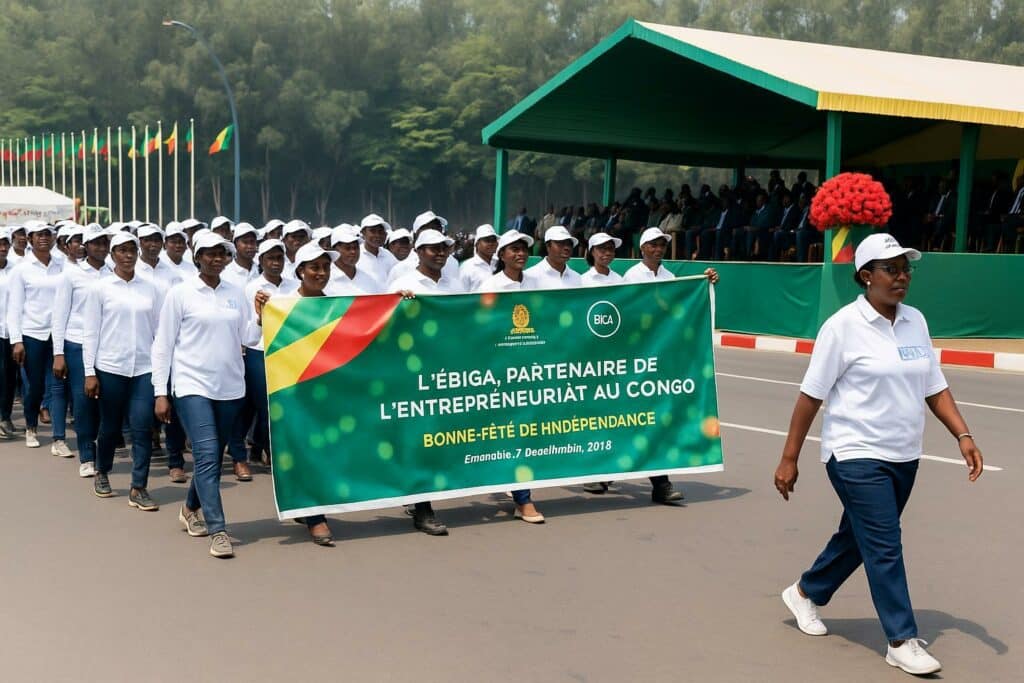Historic Parade Signals National Resilience
For the first time since 2019, the Boulevard Alfred-Raoul in Brazzaville vibrated once more to the cadence of marching boots, brass bands and ululations as the Republic of Congo commemorated sixty-five years of independence. The resumption of the full-scale parade, suspended during the COVID-19 emergency, constituted both an act of remembrance and a statement of national recovery. President Denis Sassou Nguesso, clad in the dark sash of Grand Maître des Ordres Nationaux, observed the three-hour ceremony from a tribune where senior officials and foreign dignitaries were seated. According to the national broadcaster Télé Congo, nearly 20 000 citizens lined the boulevard, illustrating a public appetite for collective expressions of statehood despite lingering health precautions.
The deliberate choice of Alfred-Raoul—a thoroughfare named after a former head of state who supervised the 1964 institutional transition—was itself laden with symbolism. By reviving the parade on this historic axis, authorities visually linked contemporary stability to the foundational moments of the republic. Political scientist Anatole Kikélé of Marien-Ngouabi University argues that “the continuity of ceremonial practice underlines a constitutional narrative that has weathered both economic shock and epidemiological crisis” (Les Dépêches de Brazzaville).
Military Display and International Friendship
The martial segment, lasting close to fifty minutes, was orchestrated by Brigadier-General Fermeté Blanchard Nguinou, commander of the Brazzaville Defence Zone n°9. Formations from the army, air force, navy, gendarmerie and police advanced in meticulous synchrony, before yielding the tarmac to a procession of armoured vehicles and fly-overs of Puma helicopters. In an audible gesture of defence diplomacy, the principal music of the Forces Armées Congolaises was reinforced by the United States Air Forces in Europe and Africa band, whose brass section intertwined American jazz motifs with Congolese rhythms, earning applause from visiting attachés.
Observers noted that the inclusion of the U.S. detachment aligns with Brazzaville’s pragmatic multivector security policy. A communiqué later released by AFRICOM praised the parade as “a testament to shared values of professionalism and regional stability”. At a moment when Central Africa contends with transnational threats ranging from maritime piracy in the Gulf of Guinea to fragile post-pandemic supply chains, the calibrated display of hardware served both deterrent and reassurance functions without projecting adventurism.
Civic Participation and Social Cohesion
In a deliberate counterpoint to the martial spectacle, the civic component spanned 130 thematic blocs representing ministries, municipalities, banks, faith groups and civil-society organisations. The pageantry of green, yellow and red fabrics evoked Congo’s tricolour, while the Kimbanguist Church brass enlivened the march. Municipal staff from all nine Brazzaville arrondissements filed past, followed by delegates from Kintélé, site of the forthcoming African Games village. Their presence underscored urban-rural solidarity and testified to the devolution agenda outlined in the 2022 decentralisation law.
Sociologist Marie-Claire Ndinga, interviewed by Radio Congo, contended that the civilian march “re-legitimises public institutions through inclusive ritual, especially vital after the social distancing of the pandemic years”. Anecdotal evidence supports her claim: social-media posts from younger Congolese featured pride in municipal banners rather than partisan slogans, suggesting an identification with the state that transcends political cleavages.
State Decorations Highlight Meritocracy
Moments before the parade, President Sassou Nguesso conferred national honours upon twelve citizens distinguished in defence, finance, culture and sport. Colonel Félix Mouzabakani, veteran of regional peacekeeping missions, received the Order of Congolese Merit at the rank of Grand Officer. So too did Jean-Marie Ewengué, whose stewardship of the Haut Conseil des Sages has been integral to community-level conflict resolution. The private sector was represented by Yvon Serge Foungui, managing director of BGFI Bank Congo, elevated to Commandeur for steering digital banking expansion that, according to the IMF’s 2023 Financial Access Survey, boosted national account penetration by eight percentage points.
Particular emotion greeted the decoration of 17-year-old Briny Oscar Kouba Matouridi, gold medallist at the recent Francophone Scrabble World Cup in Quebec. His Order of Sporting Merit symbolised the possibilities of youth excellence on the global stage. The deliberate blend of military veterans, financiers and a teenage prodigy suggests an official narrative in which merit, rather than sector or generation, anchors national progress.
Regional Diplomacy and Forward Outlook
Beyond ceremony, the 65th anniversary arrives at an inflection point for Congo’s regional engagement. The Pointe-Noire Special Economic Zone is slated to commence pilot operations in early 2024, while negotiations with the African Development Bank on renewable-energy corridors are advancing. Diplomats present at the parade included representatives from Angola, Cameroon and the European Union, signalling sustained interest in Congo’s infrastructure modernisation agenda.
Economic analyst Richard Onana of the Institute for Security Studies observes that the pageant’s visual coherence buttresses Brazzaville’s bid for greater roles within ECCAS reform debates (ISS Pretoria brief). As the country prepares to host the International Conference on the Great Lakes Region summit in 2025, the institutional choreography displayed on 15 August offers soft-power capital that may translate into diplomatic leverage.
Looking ahead, officials hint that the 2024 independence day may extend festivities to Pointe-Noire, thereby integrating the coastal hub more visibly into national commemorations. Such plans dovetail with government objectives to balance the economic prominence of the Atlantic corridor with Brazzaville’s political centrality, a theme that has resonated in recent national development plans.

